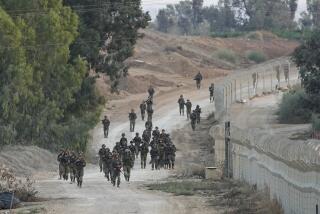Military Incompetence : WHY THE AMERICAN MILITARY DOESN’T WIN by Richard A. Gabriel (Hill & Wang: $16.95; 208 pp.)
It would appear to be open season on the American defense establishment. Horror stories of expensive weapons that fail to work are daily news; $1,000 coffee makers outrage congressional investigations. Richard Gabriel, a professor of politics at St. Anselm College, weighs in with criticism that is as straightforward as his title: “The record over the last fifteen years of military ventures has been demonstrably one of failure bordering upon incompetence.” Handing up this indictment, he asks, “Are there systemic institutionalized practices and values that increase the probability of military failure?” and answers, “yes.” He concludes that “When the military as a matter of course produces people who cannot do their jobs, the system is corrupt.”
To support his charges, Gabriel offers five case histories of U.S. military engagements in the last 15 years. The examples include: the 1970 operation to rescue American pilots from Sontay prison in North Vietnam; the 1975 attempt to liberate the crew of the “Mayaguez” from their Cambodian captors; the aborted 1980 raid to free the American embassy hostages from the Iranian revolutionaries; the tragic experiences of the Marines in Lebanon between 1982 and 1984; and the 1984 invasion of the Caribbean island of Grenada. In each instance, Gabriel details how failures in military planning and, especially, intelligence gathering and processes led directly to predictable defeats.
Although the cases are quite different, Gabriel claims that the underlying cause for American shortcomings is the same, namely the basic incompetence of the U.S. officer corps. It does not know how to plan or execute a military campaign. Furthermore, it suffers from a lack of direction and resolve. The reasons behind this incompetence are that the corps is too large, fractious and self-serving. Its “achievers” are trained managers, not warriors. Gabriel argues that the present value structure of the military must be changed. Military officers must be willing to fight for the nation rather than for their individual advancements or services. The military must develop “warrior poets” who appreciate the human dimensions of conflict rather than the technical or business aspects of war. More concretely, he also calls for the replacement of the present Joint Chiefs of Staff with a general staff and the return to the universal military draft as a replacement for the current all-volunteer force.
Gabriel’s descriptions and prescriptions are persuasive. They merit close attention. But they are at base simplistic and strongly biased to match his predisposition. The situation is much more complex than the book allows. War is always a dicey endeavor in which the best laid plans usually come a cropper, but only in retrospect. Military intelligence is so consistently unreliable that Mark Twain once referred to it as a contradiction in terms. Finally, of course, the American military operates under the deliberate control of our political leaders, a condition Gabriel completely ignores.
While Gabriel can cite a record of U.S. military failures in the last decade, there is scant reason to believe that his recommendations would produce the desired improvements. Reformers’ favorite exemplar--the German General Staff--was defeated in two world wars. Why should we assume that reluctant draftees would be better soldiers than volunteers?
As “Military Incompetence” documents, the record of the American military is unquestionably worrisome. But the causes and cures are far more involved than Gabriel recognizes. Although one might well wish to consider his recommendations, they should only be treated as possible partial solutions to problems that could be far more complex than simple “Military Incompetence” implies.
More to Read
Sign up for Essential California
The most important California stories and recommendations in your inbox every morning.
You may occasionally receive promotional content from the Los Angeles Times.










